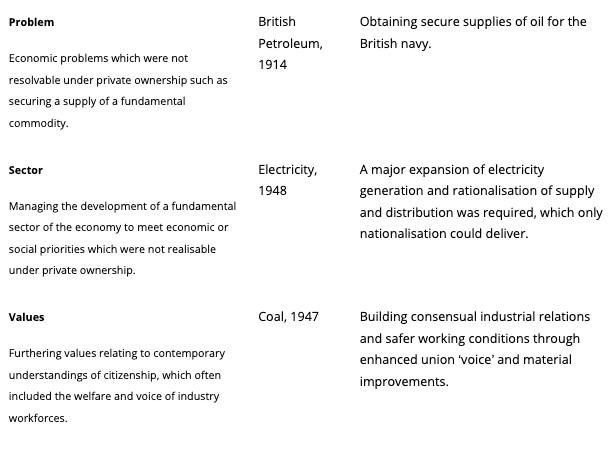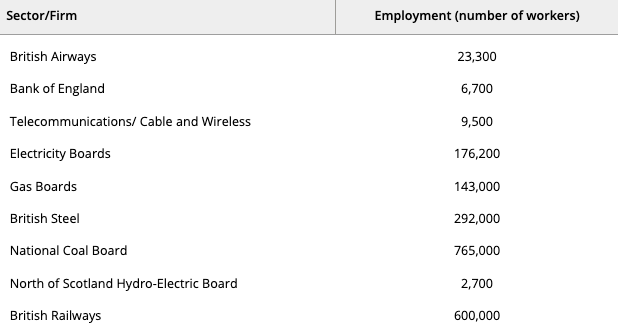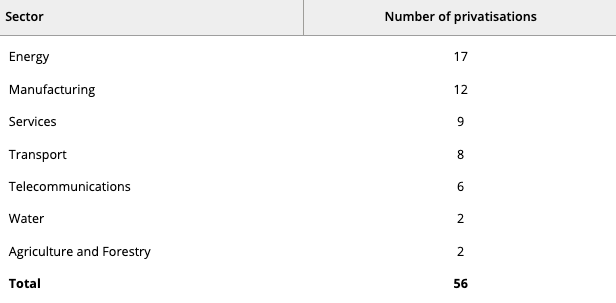| 5 mins read
Public ownership has emerged in the United Kingdom in the late 2010s and early 2020s as a desirable and pragmatic response to a range of economic and social problems.
Nationalisation is a contentious label which can promote positive and negative connotations. This article suggests a new interpretation. In the past, public ownership was organised around three fundamentals: problems, sectors and values. Fundamental problems are beyond the purview of existing systems of organisation. Fundamental sectors anchor the economy. Fundamental values relate to citizenship and security. Not mutually exclusive, these were three drivers of demand for public ownership in particular sectors and at particular times.
We first establish the fundamentals of public ownership in reference to the history of nationalisation measures undertaken by UK governments in the twentieth century. Then three new Scottish government public ownership initiatives are examined, refining the fundamentals typology: shipbuilding, social care and railways.
The fundamentals of public ownership
A typology of three rationales for nationalisation is provided in Table 1. While rarely mutually exclusive, different fundamentals have been emphasised to a greater and lesser degree in different nationalisations. No instances of nationalisation come easily to mind where none of these rationales applied.

Table 1. Typology of public ownership

Table 2. Labour's nationalisation programme of 1945–51

Table 3. UK privatisations by sector, 1979–1997
Devolution and public ownership in Scotland
Since 2014 there has been a new enthusiasm for nationalisation from the Scottish government. Three examples, briefly discussed below, illustrate this appetite and refine our three-part typology of public ownership.
Ferguson's shipyard
The shipyard in Port Glasgow has a long history, stretching back to at least 1903. It has long fulfilled contracts for the private and public sector, including the Ministry of Defence and Caledonian MacBrayne, itself a nationalised operation running essential ferry routes on the west of Scotland. In 2015 Ferguson's won a contract to build two ferries for Caledonian MacBrayne, but suffered from escalating cost and delays, leading to administration in 2019. The Scottish government responded by nationalising the yard. Public ownership in this case can be understood as driven by fundamental values: preserving local employment and maintaining Scottish capacity to build passenger ferries.
By these criteria the nationalisation was initially successful, but there were significant production difficulties, which resulted in political problems for the government. New contracts to sustain the yard in the longer term were not forthcoming. There has also been substantial criticism of the process surrounding the nationalisation decision.
National Care Service
During the Covid-19 pandemic, the shortcomings of the current provision of social care, particularly for older adults, was laid bare. The sector is known for employing a large female workforce, typically on low wages and with little career progression. Public ownership of social care was required owing to a coordination problem. A decentralised sector, with mixed forms of ownership, was judged incapable.
The Scottish government has announced its intention to bring social care services into a National Care Service (NCS). There have been many criticisms of the proposals, including that the NCS might only involve a franchising of service provision, with little change to skills development, wages, quality of service provision, or funding.
Scotrail
Passenger rail is another instance of a fundamental sector absorbed into public ownership by the Scottish government in recent years. Since rail privatisation in the 1990s, there has been a complex arrangement for service provision, with Network Rail managing the physical infrastructure and a series of train operating companies (TOCs) providing the trains (usually on lease) and train services to the public. Scotrail was nationalised in 2022.
The transfer was not smooth. Ongoing pay disputes at the time of nationalisation involved overtime bans and strikes of different groups of rail workers. It was telling that these disputes were less prolonged and extensive in the Scotrail network. Profits, moreover, were no longer being extracted from the public purse, or reinvested in an overseas rail network.
Opportunities for learning and unanswered questions
Given the extent of privatisation that occurred under Conservative UK governments from 1979 to 1997, the institutional memory of public ownership for current policy makers is thin. Contemporary Scottish innovations, therefore, provide important potential for learning. Within recent Scottish experiences of public ownership, there has been disappointment over the extent of change and concerns over performance, although there are signs, from the railways, of a strengthening workforce voice. There is recognition of the utility of nationalisation as a response to poor private sector performance in strategic economic sectors. There are, however, uncertainties about how it should be executed. The frontier of public ownership will remain politically contentious, but pressures to extend it will continue to be founded on arguments rooted in the failure of private ownership to match the requirements of fundamental problems, sectors and values.
Need help using Wiley? Click here for help using Wiley









